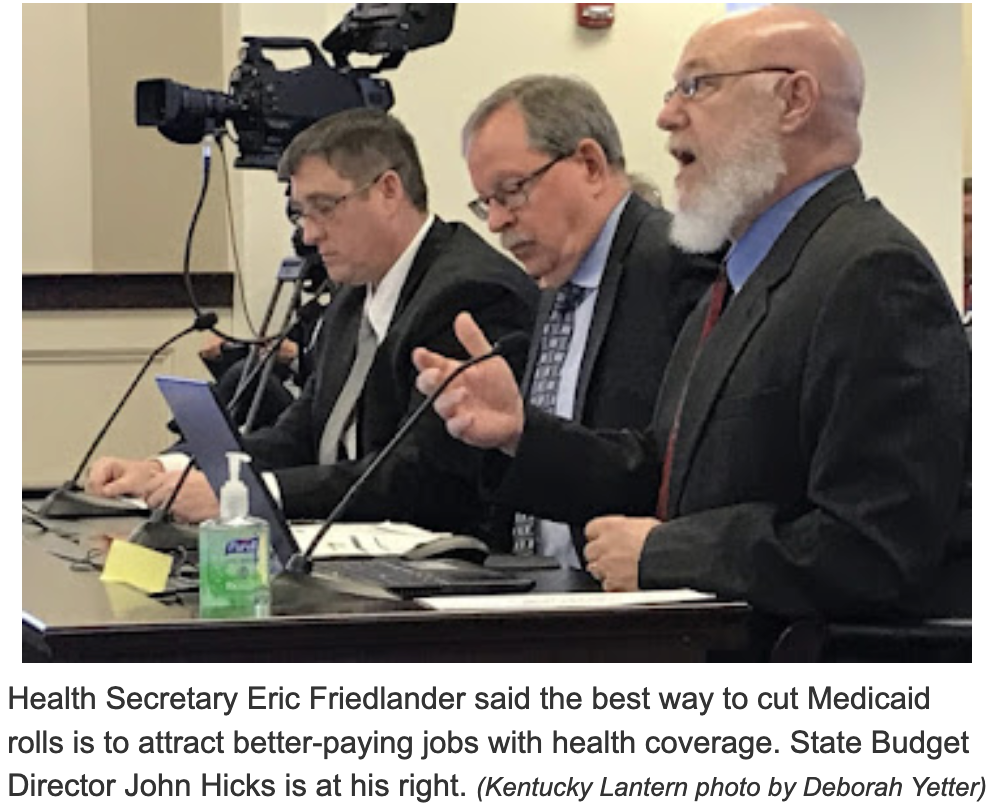Beshear lieutenants tell Senate that the House didn’t budget enough for Medicaid, based on enrollments they have projected

By Deborah Yetter
Kentucky Lantern
The state Senate began its review of the House two-year budget proposal Feb. 14, starting with Medicaid, which spends $15 billion a year to provide health coverage and other services to about 1.5 million Kentuckians who are low-income, disabled or meet other criteria.
The Senate Appropriations and Revenue Committee heard from Eric Friedlander, secretary of the Cabinet for Health and Family Services, and John Hicks, budget director for Gov. Andy Beshear — chiefly about their concerns over cuts in the state’s share of the program that gets 70%’ to 80% of its money from the federal government.
Advocates worry the House plan could force cutbacks in Medicaid services in FY 2025 through more than $900 million in cuts to the amount sought by Beshear, a Democrat, in his budget proposal.
Republicans, who firmly control both chambers of the General Assembly, will enact the final budget.
Jason Bailey, executive director of the Kentucky Center for Economic Policy, told the Kentucky Lantern that overall, the House plan cuts about $139 million in state funds Beshear sought for Medicaid in FY 2025, which would cause the state to pass up, another $783 million in federal matching money for a total of around $922 million.
Rep. Jason Petrie (R-Elkton), chairman of the House budget committee, has said the House presumes fewer people will be enrolled in Medicaid, now that the federal government is requiring enrollees to recertify annually that they are eligible. That requirement was dropped during the public health emergency of the Covid-19 pandemic.
But Hicks said state budget forecasters worked hard to project how many people will leave Medicaid—so far, around 200,000—and develop an accurate count for the governor’s budget proposal. “We’ve incorporated those numbers into the budget forecast,” he said.
Committee members made few comments as they listened to the Beshear administration officials.
Sen. David Givens, R-Greensburg, expressed concern about the growth in Medicaid, which covers about a third of Kentuckians, including more than a half million children and most nursing-home residents.
Givens asked how to reduce the number of Kentuckians enrolled in Medicaid. Friedlander said most adults who are in the prohgram and not disabled or elderly are working at low-wage jobs without health insurance.
“Getting higher-wage jobs, that’s the way that you work on having fewer people eligible for Medicaid,” Friedlander said. “I think that will make as big a difference as anything else.”
Givens suggested a committee meeting during the interim after the legislative session ends to discuss specific ways to reduce the Medicaid rolls, noting that Medicaid has grown significantly during his 15 years as a legislator. The big jump was in 2014, when the state expanded it under the 2010 Patient Protection and Affordable Care Act to households with incomes up to 138 percent of the federal poverty threshold.